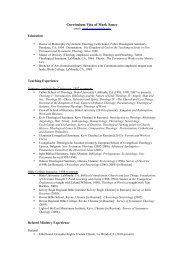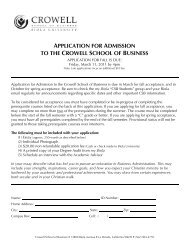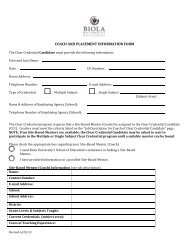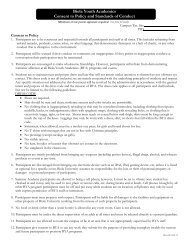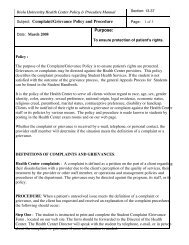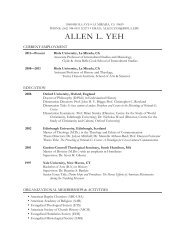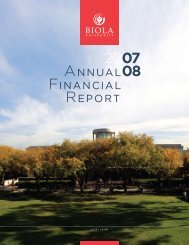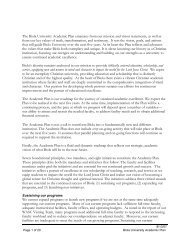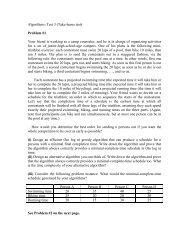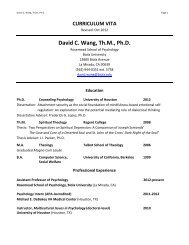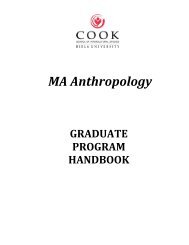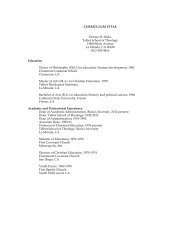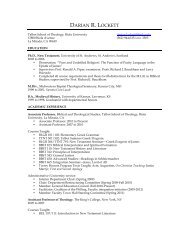Create successful ePaper yourself
Turn your PDF publications into a flip-book with our unique Google optimized e-Paper software.
Beginning in their first year of study, students participate in a<br />
variety of activities designed to promote professional awareness<br />
and personal growth. The first year activities include active training<br />
in empathy skills and on-campus pre-practicum experience. The<br />
pre-practicum course consists of exercises to assess and facilitate interpersonal<br />
skills, and the initial opportunity for the student to work<br />
with a volunteer college client in a helping role.<br />
During the second year, students usually participate in interpersonal<br />
training therapy. As participants, students personally experience<br />
some of the growth-producing aspects of interpersonal relationships.<br />
In addition, students begin their formal practicum and psychotherapy<br />
lab courses in the second year. Students are placed in such<br />
professional facilities as outpatient clinics, hospitals, college counseling<br />
centers, public schools and community health organizations<br />
on the basis of their individual readiness, needs and interests. These<br />
practicum experiences are supervised both by Rosemead’s faculty<br />
and qualified professionals working in the practicum agencies. In the<br />
psychotherapy lab courses, students receive both instruction and<br />
supervised experience, offering clinical services from the theoretical<br />
orientation of the course. Students elect lab courses from offerings<br />
such as Psychotherapy with Children and Adolescents, Marriage and<br />
Family Therapy, Group Therapy, Cognitive / Behavior Therapy with<br />
Children, Biofeedback, and Gestalt Therapy.<br />
During the third year most doctoral students take two or three psychotherapy<br />
lab courses, work in an adult outpatient practicum setting,<br />
and begin individual training therapy. This therapy is designed<br />
to give the student first-hand experience in the role of a client and is<br />
considered an opportunity for both personal growth and for learning<br />
therapeutic principles and techniques. A minimum of 50 hours<br />
of individual training are required. Such issues as timing, choice of<br />
therapist and specific goals are determined by students in conjunction<br />
with their advisors and the Clinical Training Committee.<br />
When doctoral students reach their fourth year, most of their time is<br />
spent in electives from the therapy, integration and general psychology<br />
courses; advanced practicum assignments; and independent<br />
study or research. This step-by-step progression in professional<br />
training experiences gives the student personal experience with a<br />
wide range of personalities in a variety of settings and provides the<br />
necessary preparation for a full-time internship during the fifth year<br />
of study.<br />
The internship is planned as an intensive clinical experience to<br />
help students integrate the varied elements of their preparation in<br />
psychology into a congruent professional role. All internships must<br />
be faculty approved in order to ensure a high level of professional<br />
experience for the student.<br />
Placement in practicum agencies is made by the director of clinical<br />
training and internships are obtained by the student consonant with<br />
the internship guidelines of the school. The faculty is active in helping<br />
select and obtain such placements.<br />
C h r I s t I a n aC t I v I t I e s<br />
As members of a Christian university community, Rosemead’s faculty<br />
believe the relating of one’s faith to an academic discipline goes<br />
beyond the theoretical and academic. Opportunities for fellowship,<br />
dialogue and worship are seen as vital parts of the total educational<br />
process. Consequently, all students are expected to participate<br />
in Rosemead’s weekly chapel. Various opportunities are provided<br />
during the academic year for students and their spouses to gather<br />
in faculty homes for fellowship and integration of first-year students<br />
into the Rosemead community. Students are also encouraged to<br />
become involved in one of the many local churches in the Southern<br />
California area.<br />
Graduation Requirements<br />
The major M.A., Psy.D. and Ph.D. degree requirements are summarized<br />
below. Since all students take a set of basic courses in scientific<br />
psychology as well as in clinical psychology and theology, the first<br />
three years of the Psy.D. and Ph.D. tracks are very similar.<br />
m a s t e r ’ s d e G r e e I n C l I n I C a l P s yC h o l o G y<br />
Although Rosemead does not offer a terminal Master’s program, a<br />
Master of Arts in clinical psychology is granted after the completion<br />
of the first two years of either the Ph.D. or Psy.D. curriculum, including:<br />
a. A minimum of 45 semester hours* in psychology (including<br />
practicum and psychotherapy lab courses)<br />
b. A minimum of 9 semester hours in theology<br />
C. A minimum of one year of resident graduate work. (The final<br />
semester must be in residence.)<br />
d. A transfer maximum of 9 units in theology and 9 units in<br />
psychology may be counted toward the M.A. in Clinical Psychology<br />
*“Hours” and “units” are interchangeable throughout this section.<br />
P h . d. I n C l I n I C a l P s yC h o l o G y<br />
1. Residence & Coursework<br />
Normally, four years of residency are required unless transfer<br />
of credit is brought in and advanced standing granted. While<br />
the doctorate is not awarded simply for completion of stated<br />
course work, there are basic unit requirements for the degree<br />
(133 semester hours). Each student is assigned a faculty advisor<br />
who assists in the planning of each semester’s schedule of<br />
courses and supervises the student’s progress in the program.<br />
For transfer credit, see General Academic Information.<br />
Psychology: Ph.D. students must complete a minimum of<br />
78 semester hours of psychology in addition to a doctoral<br />
dissertation. These 78 units include 50 required units, 12<br />
units of practicum that must be taken in residence, 4 units<br />
266 Rosemead School of Psychology B I O L A U N I V E R S I T Y



